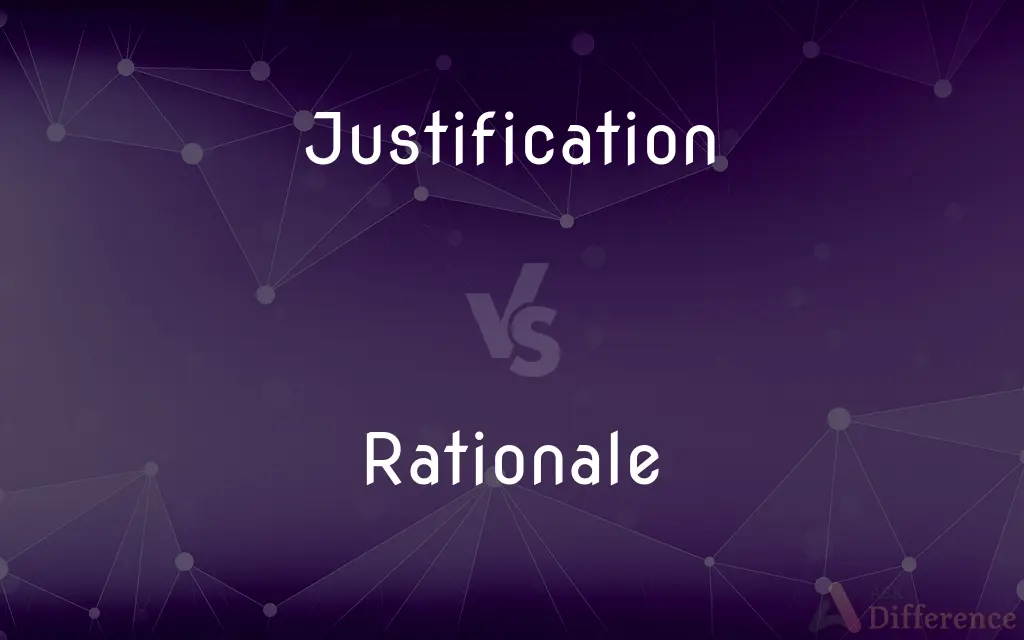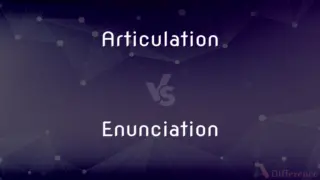Justification vs. Rationale — What's the Difference?
Edited by Tayyaba Rehman — By Urooj Arif — Updated on April 24, 2024
Justification involves proving something is right or reasonable, often after the fact, whereas rationale is the reasoning behind decisions or actions, typically outlined beforehand.

Difference Between Justification and Rationale
Table of Contents
ADVERTISEMENT
Key Differences
Justification is commonly used to defend or validate a decision or action after it has been made, emphasizing the proof of its correctness or necessity. Whereas, rationale refers to the underlying reasoning or logic that precedes an action or decision, explaining why it was considered necessary.
In legal and ethical contexts, justification might be required to demonstrate compliance with laws or moral standards, underscoring its reactive nature. On the other hand, rationale often serves as a proactive explanation in such contexts, guiding the decision-making process before actions are taken.
Justification can be subjective, influenced by personal or societal values and often needing to persuade others of its validity. Conversely, a rationale is typically more objective, grounded in logical reasoning or factual basis.
When it comes to academic or professional projects, justification is crucial for validating methods and results, particularly in response to critiques or questions. Whereas rationale is essential at the project's inception, laying out the foundational principles and objectives.
In everyday conversation, justifications are often offered in response to questioning or skepticism about one's choices, requiring an element of persuasion. Rationale, however, is usually shared to inform or clarify intentions before any objections arise, aiming for transparency rather than defense.
ADVERTISEMENT
Comparison Chart
Definition
A defense of an action or decision
The reasoning behind a decision
Usage Context
Often reactive; after decisions
Proactive; before or during decisions
Nature
Can be subjective and persuasive
Generally objective and explanatory
Importance in Fields
Critical in law, ethics, debate
Key in planning, academic research
Example Usage
Justifying expenses in a budget report
Providing rationale for a research approach
Compare with Definitions
Justification
The act of showing something to be right or reasonable.
His justification of the decision was difficult to accept but logical.
Rationale
A narrative or statement providing explanations about a situation or decision.
The document included a rationale for each recommended procedure.
Justification
A reason or explanation for an action that asserts its correctness.
The manager’s justification for the layoffs was the company’s declining revenue.
Rationale
A set of reasons or a logical basis for a course of action or a particular belief.
She provided a detailed rationale for the new corporate strategy.
Justification
The alignment of text in a document to appear evenly along the left and right margins.
She preferred full justification for the text in her documents.
Rationale
Explanation of the underlying reasons in an argument or presentation.
The rationale for the change was clearly communicated in the meeting.
Justification
In theology, the act of God declaring a sinner righteous by faith.
The preacher discussed the concept of justification by faith alone.
Rationale
A systematic justification of a proposed theory or undertaking.
He wrote a rationale for the study that outlined its importance.
Justification
A factor that vindicates a morally questionable act.
In his view, self-defense was the only justification for violence.
Rationale
In pedagogy, a statement that explains the purpose and goals of a lesson plan.
Her lesson plan included a rationale that addressed educational standards.
Justification
The act of justifying.
Rationale
The fundamental reasons for something; the basis
The rationale for dropping the atomic bomb.
Justification
The condition or fact of being justified.
Rationale
An explanation of the basis or fundamental reasons for something.en
Justification
Something, such as a fact or circumstance, that justifies
Considered misgovernment to be a justification for revolution.
Rationale
A justification or rationalization for something.
Justification
(countable) A reason, explanation, or excuse which someone believes provides convincing, morally acceptable support for behavior or for a belief or occurrence.
Rationale
A liturgical vestment worn by some Christian bishops of various denominations.
Justification
The forgiveness of sin.
Rationale
An explanation or exposition of the principles of some opinion, action, hypothesis, phenomenon, or the like; also, the principles themselves.
Justification
The alignment of text to the left margin (left justification), the right margin (right justification), or both margins (full justification).
Rationale
(law) an explanation of the fundamental reasons (especially an explanation of the working of some device in terms of laws of nature);
The rationale for capital punishment
The principles of internal-combustion engines
Justification
The act of justifying or the state of being justified; a showing or proving to be just or conformable to law, justice, right, or duty; defense; vindication; support; as, arguments in justification of the prisoner's conduct; his disobedience admits justification.
I hope, for my brother's justification, he wrote this but as an essay or taste of my virtue.
Justification
The showing in court of a sufficient lawful reason why a party charged or accused did that for which he is called to answer.
Justification
The act of justifying, or the state of being justified, in respect to God's requirements.
Who was delivered for our offenses, and was raised again for our justification.
In such righteousnessTo them by faith imputed, they may findJustification toward God, and peaceOf conscience.
Justification
Adjustment of type (in printing), or of the final spacing of printed text, by spacing it so as to make it exactly fill a line, or line up at one edge of the allotted portion of the printed page; adjustment of a cut so as to hold it in the right place; also, the leads, quads, etc., used for making such adjustment; as, left justification is the most common format for simple letters, but left and right justification is typically used in books.
Justification
Something (such as a fact or circumstance) that shows an action to be reasonable or necessary;
He considered misrule a justification for revolution
Justification
A statement in explanation of some action or belief
Justification
The act of defending or explaining or making excuses for by reasoning;
The justification of barbarous means by holy ends
Common Curiosities
Can justification and rationale be interchangeable?
Not typically, as they serve different purposes in the timeline of decision-making.
How does justification impact legal proceedings?
Justification can serve as a defense, explaining why actions met legal or ethical standards.
What role does rationale play in academic research?
It underpins the study's design and methods, clarifying its purpose and importance.
What is the main difference between justification and rationale?
Justification is defending actions as right after the fact, whereas rationale is the reasoning given before actions.
Is justification always required in business settings?
Often, especially when decisions affect finances or personnel, to explain the reasons behind actions.
Can a weak rationale lead to poor decision-making?
Yes, as it may fail to provide a solid foundation for the decisions, affecting outcomes negatively.
Why is rationale important in project management?
It guides initial planning and ensures all stakeholders understand the project’s objectives.
How can one improve their skill in providing justifications?
By practicing clear, logical reasoning and understanding various ethical perspectives.
How should rationales be presented in educational settings?
Clearly and concisely, to ensure understanding and alignment with educational goals.
How does one effectively communicate a rationale?
By being clear, logical, and thorough in the explanation of decision-making processes.
How do justifications and rationales differ in scientific research?
Justifications defend methodologies or conclusions, whereas rationales explain the choice of methodologies.
Are there situations where both justification and rationale are needed?
Yes, particularly in comprehensive planning and review processes, both before and after decisions are made.
What is an example of a moral justification?
Arguing that breaking a law was justifiable to save lives.
What happens if a justification is not accepted?
The action or decision may face continued scrutiny or rejection from others.
Can cultural differences impact what is considered a valid justification?
Yes, cultural norms and values can influence what is seen as acceptable or reasonable.
Share Your Discovery

Previous Comparison
Articulation vs. Enunciation
Next Comparison
Global vs. NationalAuthor Spotlight
Written by
Urooj ArifUrooj is a skilled content writer at Ask Difference, known for her exceptional ability to simplify complex topics into engaging and informative content. With a passion for research and a flair for clear, concise writing, she consistently delivers articles that resonate with our diverse audience.
Edited by
Tayyaba RehmanTayyaba Rehman is a distinguished writer, currently serving as a primary contributor to askdifference.com. As a researcher in semantics and etymology, Tayyaba's passion for the complexity of languages and their distinctions has found a perfect home on the platform. Tayyaba delves into the intricacies of language, distinguishing between commonly confused words and phrases, thereby providing clarity for readers worldwide.














































